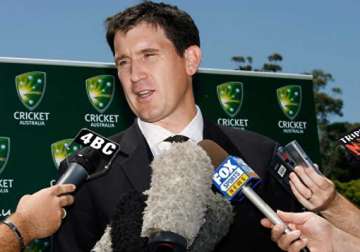Melbourne, Jun 8: Cricket Australia chief executive James Sutherland says he is "surprised and a little bit disappointed" at a players' union response to a pay offer that could see the country's top players 80 million Australian dollars ($78.5 million) better off over the next five years.
The current pay deal between CA and the Australian Cricketers' Association expires on June 30, and Sutherland said Friday that as that deadline looms the parties are "further apart than we would like to be."
He said Cricket Australia wants to introduce a new performance-based pay system, which on conservative estimates would see players share $80 million more over the next five years than in the preceding five year period.
"We have put a very substantial offer on the table," Sutherland said. "It's in the vicinity of $80 million more over a five-year period than what we paid in the preceding five-year period.
"And $80 million is a lot of money and that is based on our conservative revenue projections. If we go halfway towards meeting our more optimistic ambitions with revenue growth, that increase in player payments will be even more significant than $80 million."
The players' association believes Cricket Australia's reworked definition of revenue could mean it withholds as much as 30 million Australian dollars ($29.5 million) from players over the next five years. Players currently get 26 per cent of cricket revenue generated by Cricket Australia.
Contracts for national team players and players in the Twenty20 Big Bash League have been frozen until a new agreement is struck.
Sutherland said he was disappointed by the stance of the Cricketers' Association. He said a move to a performance-based system was logical.
"The focus is very much about performance and accountability for performance," Sutherland said. "There is also a sense of accountability with this that the public would expect: that the players wouldn't get the same amount of money for losing 4-0 as they would winning 4-0.
"There is an argument that there is already a performance-based culture and expectation. The players have to perform to get their contract, they have to perform to get an increase in the value of their contract."
Sutherland said there was also an element of relative performance "against the rest of the world, against the teams that you play against.
"And we believe that Australian players should be paid more for winning games against other teams, they should be paid more for being higher-ranked against other teams," he said.
"Whereas at the moment, the model is more about relativity against the list of Australian players rather than performance against the rest of the world."
